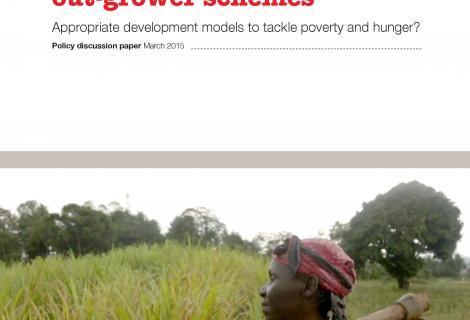
Out-grower schemes (often referred to as contract farming in academic and other literature) are an important component of many current public-private partnerships (PPPs) in developing countries, including the G8’s New Alliance. Such schemes often appeal to farmers because the company often provides inputs and production services. In addition, farming incomes can rise and such schemes often open up new markets and provide new technology.
But they also present several major problems. Out-grower schemes and contract farming often exclude precisely the groups that ActionAid works with most: the poor, women, the landless, and marginal or subsistence farmers.
Out-grower schemes offer access to land that would not otherwise be available to a company and can also be a disguised form of land grab. Such a project (with a plantation) is being implemented in a community in Tanzania that ActionAid has worked with for many years. People will be displaced, and land often used for growing food is being taken despite opposition from some local people. ActionAid found that many within the community had no details of the associated out-growers scheme. Overall, many believe they have not been adequately informed or consulted about the impacts the project will have on their livelihoods and their rights to food and land. This means that the whole project is a ‘land-grab’ under existing definitions.1
Criticisms of out-grower schemes and contract farming reveal the unequal power relationship between a company and farmers. Farmers often provide both the land and cheap labour, and at the same time carry most of the risk. An analysis of contracts found that many only include basic details that are unlikely to promote the interests of small farmers. For example few contracts stipulate the duration of the partnership or provide details on the specific inputs provided to farmers. Schemes are almost invariably geared towards (often non-food) crops for export or large urban markets. They therefore tend to consolidate and promote the role of large corporations in global agriculture supply chains.
The evidence reveals that most existing contract farming and out-grower schemes are not an appropriate development model to tackle poverty and hunger; they rarely meet any of what ActionAid believes is the minimum requirements that would allow them to do so (see Box 2).
National government support to agriculture - especially public investment targeted at the poor, small-holder farmers and women rather than partnerships with large private companies – is proven to be one of the most important ways to achieve food security and alleviate poverty. ActionAid is not against all private investment in sustainable agriculture – small-scale producers and co-operatives, for example, are part of the private sector and have been instrumental in successfully tackling hunger in a number of countries.2 The world’s 500 million small farms produce the majority of food, particularly in developing countries, while simultaneously employing the most undernourished people in the world. Farmers themselves must be central to any strategy aimed at increasing the quantity and effectiveness of agricultural investment.